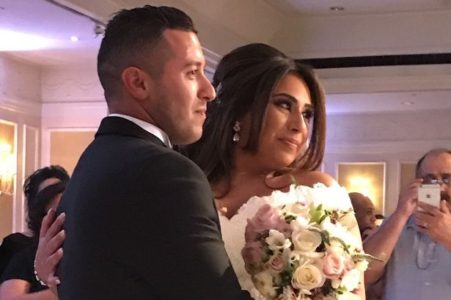By Wayne Lee-
A British woman has revealed how her honeymoon was ruined after being held in detention for 26 hours by US border officials before being sent back to the UK.
Natasha Politakis told reporters that she and her husband, Ali Gul, were both barred from entering the US after flying to Los Angeles to commence their £7,000 honeymoon. Exacerbating her experience was the fact that the US embassy declined to explain why the woman and her husbandwere refused entry last May.
The couple from Enfield, north London, were ehading for Hawaii when their nightmare began. 32 year old Gul had applied for a visa though the US embassy in London, after previously being turned down for a visa for a different trip when he applied through Esta . Gul had been issued with a 10 year visa by the embassy.
“It was for no reason,” said Politakis. “We tried to talk to the embassy but they said just go on the website and there was no explanation there. We had visas, we had everything. We were treated like criminals.” The couple were given no explanation for their detention.
“It’s a long time, and it feels like forever when you are in there. No one tells you anything and then they said to us: ‘You’re not going to Hawaii, you’re going to be flown back on the first flight tomorrow.’ They escorted us on to the flight. They wouldn’t give us our phones or our passports until we were back in the UK” Concerned family members were very worried when they heard no news about their arrival.
Politaki told reporters she would not travel to the U.S ever again. “I’m too scared now, after what happened. I’ve never been in trouble or anything before. All our friends and family are shocked.” It is not the first time British nationals have been refused entry to the U.S since Donald Trump’s presidency. There have always been various circumstances in the past when British citizens have been refused entry to the U.K. Usually it has been for past criminal records or a failure to declare a brush with the law either in the U.K or the U.S. The difference now is that an explanantion was formerly given, but things have changed now.
President Trump has made clear his objections to allowing visitors from seven countries but has met opposition from the U.S Supreme Court on two occassions. It now appears that U.S immigration officials are using thir discretion to prevent some passengers from entering the U.S.
The general belief is that Gul’s Turkish origin might have been the problem, but without a clear explanation for the refusal, there could be other reasons responsible for the refusal. The real problem is why the U.S embassy will not provide an explanation to the media for the barred entry which ruined the honeymoon of this couple.
One known fact is that British citizens who have visited Libya, Iran, Somalia, Sudan, Syria or Yemen since 2011,face suspicion of terrorist related incidences or being acquainted with extremists. And in such circumstances of suspicion, neither the U.S embassy or the U.S government will want to explain the reasons to avoid the predictable controversy that would follow.
STRINGENT
Trump has faced criticism for introducing stringent entry rules for visa applicants from certain Muslim countries like Syria, Sudan, Somalia, Libya, Iran and Yemen. Without a personal relationship with a family member already residing in the U.S, visitors from those countries will never be allowed to the United States. However, this condition is not actually that strict because determined passengers from those countries can always arrange for a family member to claim they have a personal relationship with them.
A number of Americans are in support of Trump’s strict stance because of concerns of terrorism.
British citizens face difficulties getting a US visa if they have travelled to Libya, Iran, Iraq, Somalia, Sudan, Syria or Yemen since March 2011.
“We’ve travelled to so many countries together. Neither of us have ever been to America before. This was the first time we were going, for our honeymoon, and then all this happened.”
A spokesperson for the US embassy refused to comment on the case, but said there were “more than 60 grounds of inadmissibility divided into several major categories, including health-related, prior criminal convictions, security reasons, public charge, labour certification, illegal entrants and immigration violations, documentation requirements, and miscellaneous grounds.”




